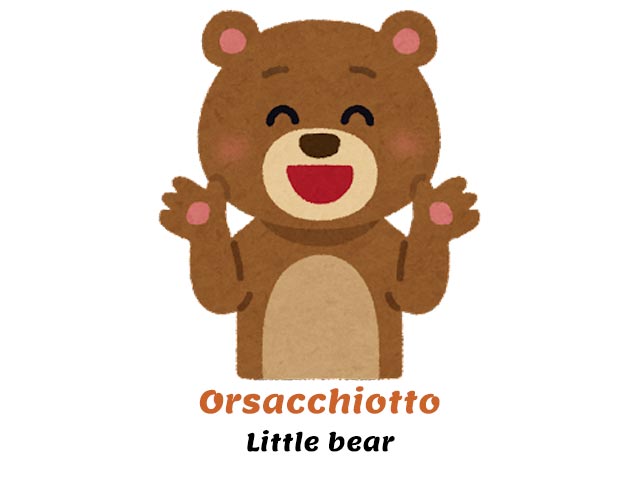How do you say it in Italian?
Orsacchiotto
Orsacchiotto is the most common way to say little bear in Italian.
Orsacchiotto
Little bear

Little bear in Italian can be literally translated as piccolo orso, but we don’t really use this expression.
It is a masculine noun, so it uses the articles il (definite, the little bear), and un (indefinite, a little bear).
Un orsacchiotto
A little bear
Degli orsacchiotti
Some little bears
L’orsacchiotto
The little bear
Gli orsacchiotti
The little bears
It’s worth noting that orsacchiotto in Italian has two different translations in English. It can mean:
- bear cub
- teddy bear (especially in the expression orsacchiotto di peluche or di pezza)
For example, you can say…
Per Natale ho regalato a mio figlio un morbido orsacchiotto di peluche.
For Christmas, I gave my son a soft teddy bear.
Mamma orsa controlla che tutti gli orsacchiotti la stiano seguendo.
Mama bear checks that all the bear cubs are following her.
Il cane ha strappato una cucitura del mio orsacchiotto!
The dog tore a stitch on my teddy bear!
Da bambina avevo un enorme orsacchiotto di pezza.
As a child, I had a huge stuffed teddy bear.

Orsetto
Orsetto is the other common translation for little bear in Italian, and it’s used as a perfectly interchangeable synonym for orsacchiotto.
Orsetto
Little bear, teddy bear
For example, you can say…
Oltre alla boccetta di profumo, mi hanno regalato un simpatico orsetto di peluche.
In addition to the perfume bottle, I received a cute teddy bear.
The -acchiotto and -etto suffixes
There are many descriptive suffixes in Italian that can describe a noun without using an adjective. The -acchiotto suffix is one of them, and it’s mainly used to describe the young of some animals, meaning “small and cute”. For example, lupacchiotto means “small and cute wolf pup”.
The –etto suffix behaves the same way. Orsetto and lupetto describe small and cute animal pups.

A popular expression featuring orso
There is a common and very wise Italian saying that goes non vendere la pelle dell’orso prima di averlo preso, which means “don’t count your chicken before they hatch”. It teaches us not to be in a hurry.
Non vendere la pelle dell’orso prima di averlo preso.
“Don’t sell the bearskin before you get the bear.”
There’s also a very common idiomatic expression that translates to hibernate, andare in letargo, which literally means “to go in hibernation”. For example, you could say…
Gli orsi vanno in letargo in inverno.
Bears hibernate in winter.

More free Italian resources
You might want to keep learning Italian online with these free Italian resources:
❤️ If you liked this lesson on how to say little bear in Italian, share it with your friends!


